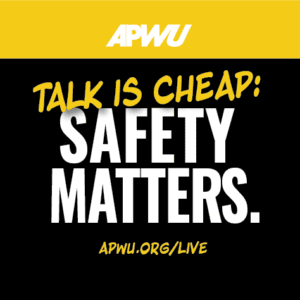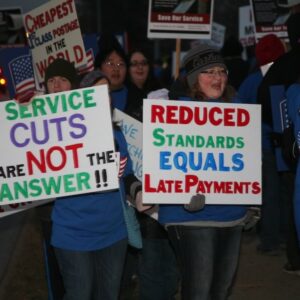March 3, 2026
Contracting Enforcement
Unlike “contract enforcement,” which is the job of all good union representatives, “contracting enforcement” refers specifically our efforts to stop management from assigning our work to non-postal employees.
Our ability to do that received a significant boost recently from a ruling by Arbitrator Shyam Das.
The issue involved the interpretation of Article 32.1.C, which was added to the Collective Bargaining Agreement (CBA) in 2006. It states:
“When a decision has been made at the Field level to subcontract bargaining unit work, the Union at the Local level will be given notification.”
At the conclusion of negotiations, the APWU firmly believed there was agreement that there are only two types of contracting decisions: national-level decisions and non-national, or “field” decisions. Put simply, “field” means everything that is not “national.”
However, shortly after ratification of the 2006 contract, the Postal Service asserted that the notification requirement didn’t apply to subcontracting decisions made at the local level.
This interpretation undermined our ability to protect our work. In the vast majority of circumstances, the work could be contracted out without the local union ever becoming aware of it. The union could challenge subcontracting only if the local union caught a contractor in the act. That after-the-fact type of challenge deprived us of the opportunity to ensure compliance with the CBA before the opportunity to perform the work ourselves was lost.
The Ruling
Arbitrator Das saw through the Postal Service’s subterfuge. He wrote:
“The Union’s position in this case that Article 32.1.C requires notification to the local union of decisions to subcontract bargaining unit work at local installations made at the local, as well as district or area, level is sustained. As the Union acknowledges, Article 32.1.C does not require notification before a decision to subcontract is made, and where work is subcontracted pursuant to a master agreement the local union need only be notified when the master agreement is entered into, and not when each service is to be performed thereunder.” (Emphasis in original)
This very clear language supports the union’s position at the hearing. It’s true that, unlike the advance notification required for national-level contracting out, management can notify a local of the decision to contract out after the decision is made. However, notification should be given before the contractor begins work.
The local union representative should follow through with a full investigation of the decision to contract out our work.
Arbitrator Das wrote:
“The evidence does not support the Postal Service’s argument that the Union had reason to know of the interpretation the Postal Service asserts it attached to the term “Field level” in Article 32.1.C during the 2006 negotiations, and, objectively, it must be concluded that the term ‘Field level’ as used in that provision includes local as well as district and area decision making.” (Emphasis added)
The award also contains the requirement that for “a master agreement,” (which is similar to a service contract such as those used for lawn care or snow removal) management must notify the local union at the point the agreement is entered into. This provides the local a full opportunity to investigate and review, which previously did not exist. A grievance is not needed each time a local steward catches management contracting out our work. If the local determines there may be a violation of the master agreement, a grievance can be filed that specifies it covers each occurrence of management’s use of the contracted services.
Subcontracting is frequently the topic of courses offered by the Maintenance Division at conferences and conventions. Many locals have used the instruction and material with great success. Under management’s old “don’t notify anyone and see if you get away with it” mentality this frequently resulted in very large monetary awards.
Remedy
Although we agree that when we are wronged the remedy must make us “whole” and serve as deterrent for future violations, we hope the notification requirement will result in the return of craft work. This, in turn, should have a positive impact on staffing levels in all occupational groups. Additional duty assignments mean additional job security, additional choices for work schedules, more options in the type of work to perform, the prospect of retreat rights for those who have been excessed, increases in promotions and even increases in local membership.
Management’s failure to notify the local union is, in and of itself, a violation of the contract. The appropriate remedy for a violation must be based on the local fact circumstances. This is due to the wide variety of possible scenarios.
Some examples of subcontracting that require local notification include:
- Work in all post offices under the Facilities Single Source Provider (FSSP) program, including, for example, roofs, air conditioners, boilers, floors, doors, screen lines, parking lots;
- Custodial work in any office, including lawn care, snow removal, cleaning, windows, etc.;
- Project work (e.g. – painting);
- Movement of equipment;
- Repair, upgrading or modification of equipment;
- Installation of equipment;
- Site preparation work.
The only exception is if the APWU has been notified at the national level, in accordance with Article 32.1.B. If this is the case, then management should be able to supply the local with a copy of the notification to the APWU national president. If local management cannot provide a copy of the notice, then notice is required at the local level.
In either event, locals should proceed with a full subcontracting investigation and an appropriate grievance. Even if your case is held at Step 3 pending the resolution of a national-level dispute, it is important to document the subcontracting of the work. That way, the resolution of the national-level case will apply to the local case. As a reminder, all Maintenance Craft grievances denied at Step 2 should be appealed to Step 3 (or appealed directly to arbitration, as applicable) where the National Business Agent’s office will ensure the grievance is in our records.
The Maintenance Division officers wish you and yours a very happy and joyful holiday season.


